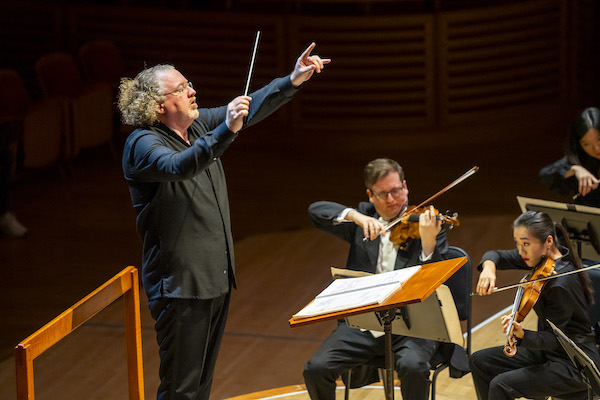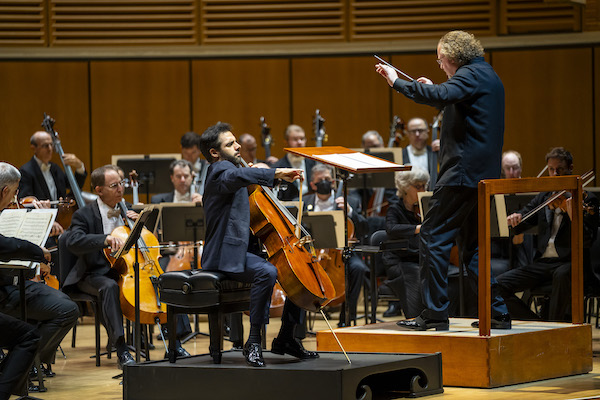Denève, Cleveland Orchestra conquer Strauss’s epic “Alpine Symphony”

Stéphane Denève conducted the Cleveland Orchestra in music of Strauss and Schumann Friday night at the Arsht Center. Photo: Alex Marlow
“This is a dream come true,” Stéphane Denève told the audience at the Arsht Center on Friday night. The artistic director of the New World Symphony was about to direct the combined forces of the Cleveland Orchestra and the New World fellows in Richard Strauss’s Alpine Symphony.
The concert was the Clevelanders’ first program in their annual Miami residency this season and the continuation of the ensemble’s collaborative relationship with the New World which began last year. Denève noted that 9 of the Cleveland players were former fellows of the orchestral academy and asked them to stand and be recognized by the enthusiastic audience.
He also emphasized that the New World-Cleveland relationship encompasses more than merely playing concerts together (including this Sunday afternoon’s chamber music program at the New World Center). Teaching and mentoring young musicians are an important part of this joint artistic venture. Indeed, many of the NWS players will eventually be members of top orchestral organizations like Cleveland.
Written in 1915, the Alpine Symphony is Strauss’ valedictory tone poem. This final work in a musical form that Strauss championed and mastered is scored for a huge orchestra with extended instruments in every section. Denève deployed 90 string players alone in an ensemble of 143 members. The 50-minute score represents Strauss at his most expansive and luxuriant. A portrait of 24 hours in the mountains, the work abounds in bold, inspired Straussian themes and resonant instrumental effects. The ascent to the peak, a pastoral interlude, a gathering storm which strikes with full fury and sunset are pictured in memorable tonal portraits.
This massive work is rarely programmed because of its sheer demands in number of musicians and difficulty. Denève’s reading was a treat to be savored.
In the opening depiction of “Night,” the depth of tone and mellow sweetness of the winds and brass immediately imprinted the distinctive Cleveland sound. At their best, the Clevelanders play with the careful, detailed blending of the best chamber music groups and the NWS players fully matched them in precise articulation and ensemble skill. “Sunrise” brought multi-colored sonorities culminating in the surging principal theme emanating from the lustrous strings. Under Denève’s attentive baton, the rising figurations of “Sunrise” were briskly conveyed, and the orchestra’s full climaxes resounded in thrilling and meltingly beautiful fashion.
As in his April New World performance of Ein Heldenleben, Denève displayed a real affinity for Strauss’s idiom, shaping melodies with supple fluidity but always maintaining a sense of the larger structure. The episodes picturing meadows, a stream and waterfall were given vigor and robust fervor. “At the Summit” brought a blaze of forceful dynamism, like an aural sunburst. As the sun gradually disappears, the conductor brought the corporate projection down to minute degrees of softness.
The tension before the storm was held in check before the total firepower was unleashed with wind machine and anvils among the enlarged percussion battery. Denève fully captured the tempest’s frightening aura. “Sunset” found the reprise of the main motif proclaimed in fortissimo splendor before a repetition by solo trumpet. The return of “Night” was spaciously phrased, with the final brass chorale eloquently stated. Denève kept his hands raised at the final soft bars and the audience admirably waited for him to lower them before applauding and immediately rising to their feet.
On the program’s first half, Pablo Ferrández was the soloist in Schumann’s Cello Concerto with the Clevelanders (sans NWS members). A Tchaikovsky Competition winner, Ferrández is an aristocrat of the instrument. Although he has technique to spare, Ferrández’s playing is more focused on subtlety than flashiness. That was perfect for Schumann’s concerto which is a late work more notable for brooding rumination than pyrotechnical display.

Pablo Ferrández performed Schumann’s Cello Concerto with the Cleveland Orchestra Friday night. Photo: Alex Marlow
Ferrández offered a satisfying, introspective and nicely restrained account of Schumann’s opus. He took a measured approach to the initial subject, showing a dark and velvety tone. There was warmth and a sense of a gravity in the slow movement. In the fireworks of the finale, Ferrández maintained an essential elegance yet was not afraid to bend a line for expressive purposes. Denève’s careful attention to dynamics greatly enhanced the reading. The orchestral contribution was highly polished, especially the rounded and well blended winds.
There were a surprising number of empty seats on Friday night. There is one remaining performance and afficionados of symphonic music should not miss this opportunity to hear one of the most unique works in the orchestral canon presented in a superb manner.
The Cleveland Orchestra repeats the program 8 p.m. Saturday at the Arsht Center in Miami. arshtcenter.org
The New World Symphony and members of the Cleveland Orchestra present a chamber concert featuring works by Dai Fujikura, Shostakovich, Schumann and Ned Rorem 2 p.m. Sunday at New World Center in Miami Beach. nws.edu
Posted in Performances
Leave a Comment
Sat Nov 18, 2023
at 1:15 pm
No Comments